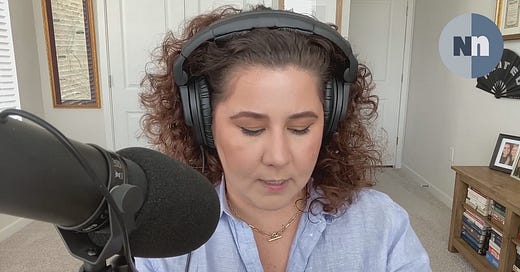Hi! Whew. *deep breaths*
Welcome back to Sam’s Pep Talk here on Nuance Needed. This week’s conversation is one I know so many of us are struggling with: how to manage our mental health when social media and the news feel completely overwhelming.
Whether you’re doom-scrolling late at night to take the edge off of a stressful day, or just trying to stay informed without spiraling, this post is for you.
Let’s talk about it.
First: You’re Not Crazy. This Is Too Much.
Over 60% of Americans now say they get the majority of their news and current event updates from social media.
Which is an absolutely wild number.
We are no longer turning to structured, edited, fact-checked news outlets. We’re watching events unfold through TikTok, Instagram stories, YouTube videos, and Substack threads. Some from people who are sharing their informed and educated opinions and insights. However; many are from people who are just average citizens sharing their unfiltered, uncertain, catastrophic thoughts in the hopes of finding people just as scared as they are. The reason being it feels good to know we’re not alone in what we’re thinking and feeling.
And as someone who works in mental health and content creation, I want to tell you something important:
We were never meant to consume this much information.
Our brains aren’t wired for this. Our nervous systems can’t keep up. And it’s okay if you feel like you’re drowning in it sometimes. Because I feel it too.
Why It Feels So Bad (It’s Not You—It’s the Algorithm)
Let’s be clear: platforms like Instagram, Facebook, and TikTok are designed to keep you feeling like your nervous system is trapped in purgatory.
Back during the Cambridge Analytica scandal, Facebook whistleblowers admitted that their algorithm promotes negative, emotionally triggering content five times more than neutral or positive content. That means you’re five times more likely to see posts that make you anxious, angry, or sad.
Why?
Because when your nervous system is activated, you’re more likely to stay glued to your phone desperately scrolling the apps. You search for solutions. You scroll for answers. You want relief from whatever bizarre hellscape timeline we are living through.
This isn’t a bug in the system. Or a whoopsies.
This is the system.
How I Protect My Mental Health as a Content Creator
As someone who posts regularly, I’ve watched this happen in real time. My most calm, balanced, empowering content? It doesn’t get nearly the reach that more dramatic, nervous-system-activating posts do. I’ve honestly accepted this as a badge of honor because it means that my content leaves people feeling better than when the post found them. And that’s all i’ve ever wanted to do as a content creator.
With that said. The TLDR is that I will not play the game that Zuckerberg and other social media execs want us playing. I want to help you navigate it too.
Here are the 3 strategies I use to consume and respond to content without letting it overwhelm me:
1. Only Take in News From Sources That Are Fact-Based, Contextual, and Correctable
I trust voices that:
Have actual backgrounds in journalism, history, politics, law, research, or any other profession.
Present facts, not feelings
Offer context and nuance
Are willing to correct themselves when/as needed
My go-to news sources on social media:
Mo News by
They present news that informs without flooding. That keeps you aware without hijacking your nervous system.
And remember: facts are meant to inform you, not incite panic. If something feels like it’s pulling you into fight-or-flight, there is a really strong chance that creator is benefiting from you feeling that way, for better and for worse. It is also worth questioning the source of that reaction—not just the content itself.
Meaning, what did that post make you feel? What about the post made you feel that way? What felt overwhelming about this? Is there something that will immediately impact you with this information? What can you do to take meaningful action in your own life that will help to mitigate some of this anxiety?
If you’re feeling overwhelmed, spend some time sitting with why and allow yourself space to find a way through it.
2. Recognize When Creators Are Chasing Engagement, Not Truth
This one is a toughy, but it’s real.
When major events happen, creators (especially those trying to grow an audience) will sometimes post highly charged, anxiety-inducing content to capitalize on the algorithm. It’s not always malicious. But it is a frustrating truth.
Watch for:
Overly emotional “hot takes”
Generalizations without evidence
Content that says “no one is talking about this” while offering no source
Posts that make you feel more confused, angry, or powerless
Just because someone has a platform doesn’t mean they have an informed perspective. So ask yourself: Is this fact? Or is this interpretation?
3. Take Breaks and Create Space for Emotional Processing
Here’s something I’ve practiced that has been game-changing:
When something major is unfolding, I will get baseline informed and then I give myself at least 24 hours before reacting emotionally. Why?
Because:
Our nervous systems need time to settle
Most initial “facts” are incomplete
Reactivity is not the same as thoughtfulness
Grounded action only comes from a grounded mind
When I feel my anxiety spiking or I sense I’m entering a doomscroll spiral, I step back. I intentionally slow my roll.
I might:
Exit the app completely
Google a summary from a source I trust (I love AP News, Reuters, and Ground News)
Switch from video to text (reading news is scientifically less stressful than watching it)
Journal, walk, or talk it out before making any decisions
And yes, I even Google: “What is going on with [topic] right now?” when I need a clear, clutter-free update.
Favorite App for Balanced News: Ground News
One tool I love is Ground News—it shows the same news story from left, right, and center-leaning sources so you can get a fuller picture. It helps me assess bias, cross-reference claims, and not get swept up in the drama of any one platform.
Highly recommend if you’re trying to cut through the noise.
You Don’t Have to React to Everything. And That’s Okay.
This is where the nuance comes in.
It’s not realistic—or healthy—to give every news story, crisis, or viral video the same emotional reaction. You are allowed to care about different things at different times. You are allowed to pace yourself. You are allowed to log off.
Some have expressed to me they are fearful that if they don’t care, no one will. What I say to that is to remind them that what doesn’t motivate you will in fact motivate someone else. That’s how collective action works. Everyone is meant to lean into their passion, they interests, their skills in order to make the world a well rounded place. That is why we all don’t have copy paste interests. Every one is different and that is, and always will be, the greatest strength that we have.
So take the breath. Take the pause. Take the break.
Final Thoughts
We’re living in a world that wants your attention more than your well-being.
And learning how to protect your peace is revolutionary.
Because protecting your mental peace is what allows you to show up in ways that feel authentic and grounded in what you feel capable of providing to the world. And we need grounded, authentic action more than ever.
If this pep talk resonated with you, I’d love to hear it in the comments. Should we do a deeper dive on this? A downloadable guide? A podcast episode? Let me know.
Until then:
Take care of yourself.
Take care of your nervous system.
And know that choosing to step away is not weakness — it’s wisdom.
With love and nuance,
Sam













Share this post